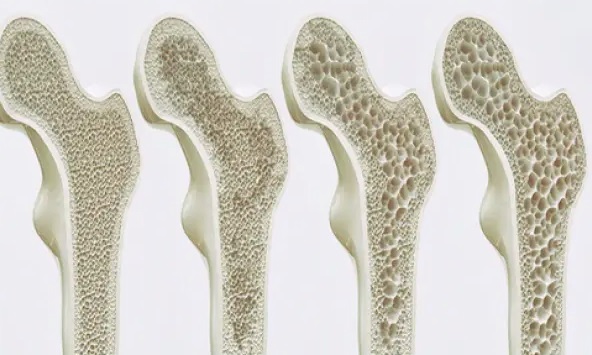Nikhil Prasad Fact checked by:Thailand Medical News Team Jul 23, 2025 6 months, 3 weeks, 1 day, 3 hours, 54 minutes ago
Medical News: Growing Evidence That COVID-19 Affects More Than Just the Lungs
A new study has revealed a worrying link between COVID-19 and increased risk of osteoporosis in people aged 50 and older, especially those with new-onset overweight, obesity, or type 2 diabetes. The research, conducted by scientists from Ditmanson Medical Foundation Chia-Yi Christian Hospital in Taiwan, is one of the largest studies of its kind to date. It followed more than 655,000 individuals across North America and Western Europe using data from the TriNetX electronic health network.
 COVID-19 Infection Tied to Rising Osteoporosis Risk in Older Adults
COVID-19 Infection Tied to Rising Osteoporosis Risk in Older Adults
This
Medical News report highlights how COVID-19 may have lingering consequences on bone health long after the virus has cleared. Researchers found that patients who had contracted COVID were significantly more likely to be diagnosed with osteoporosis or suffer bone fractures in the years that followed compared to matched individuals who never had the virus.
Risk Peaks Four Years After Infection
The study involved over 327,000 matched pairs of patients aged 50 and above. All had been newly diagnosed with either overweight, obesity, or type 2 diabetes between 2020 and 2024. Those who had contracted COVID-19 were monitored for up to six years. At the 3-year mark, these individuals had a 3.9% higher risk of developing osteoporosis than their non-COVID counterparts. By the 6-year point, this increased to nearly 10%. Even more concerning, sensitivity analysis showed a sharply escalating risk: those who had COVID were 21.2% more likely to develop osteoporosis after one year, and this risk grew to 88.4% after four years.
Subgroup analysis confirmed these findings across all demographics. Men and women, younger seniors (ages 50–60), and those with poor metabolic indicators like high BMI and blood sugar levels (HbA1c) were all found to have elevated osteoporosis risk if they had COVID-19.
Why Is COVID-19 Triggering Bone Loss
Experts believe the culprit is likely a combination of immune system changes, ongoing inflammation, and hormone disruptions caused by the virus. COVID is known to provoke a “cytokine storm” — a flood of inflammatory molecules that can overstimulate bone breakdown and reduce bone-building activity. In addition, severe COVID patients are often bedridden and treated with corticosteroids, both of which are known to weaken bones.
Long COVID symptoms like fatigue and inactivity also contribute to muscle and bone loss. Nutrient deficiencies, including low vitamin D, which is common in both COVID and diabetes patients, further impair the body’s ability to maintain bone strength.
Doctors Urged to Monitor Bone Health in COVID-19 Survivors
The study’s findings suggest that bone health checks — including bone density scans and fracture risk assessments — should become a routine part of follow-up care for COVID survivors over 50 with metabolic risk factors. Prev
entive therapies may be necessary to avoid long-term complications.
The researchers concluded that COVID-19 significantly raises the risk of osteoporosis and fractures in older adults with newly developed obesity or diabetes, and that this risk peaks four years after infection but may persist even longer. These findings support the urgent need for ongoing monitoring, early detection, and targeted interventions in this growing at-risk population.
The study findings were published in the peer reviewed journal: Medicina
https://www.mdpi.com/1648-9144/61/8/1320
For the latest COVID-19 News, keep on logging to Thailand
Medical News.
Read Also
https://www.thailandmedical.news/news/covid-19-can-trigger-shocking-condition-called-heterotopic-ossification-where-bone-grows-in-muscles-and-organs
https://www.thailandmedical.news/news/study-uncovers-hidden-cellular-communication-driving-giant-cell-bone-tumors-and-link-to-covid-19-related-pathways
https://www.thailandmedical.news/news/covid-19-weakens-bones-in-the-elderly-increasing-risk-of-fractures
